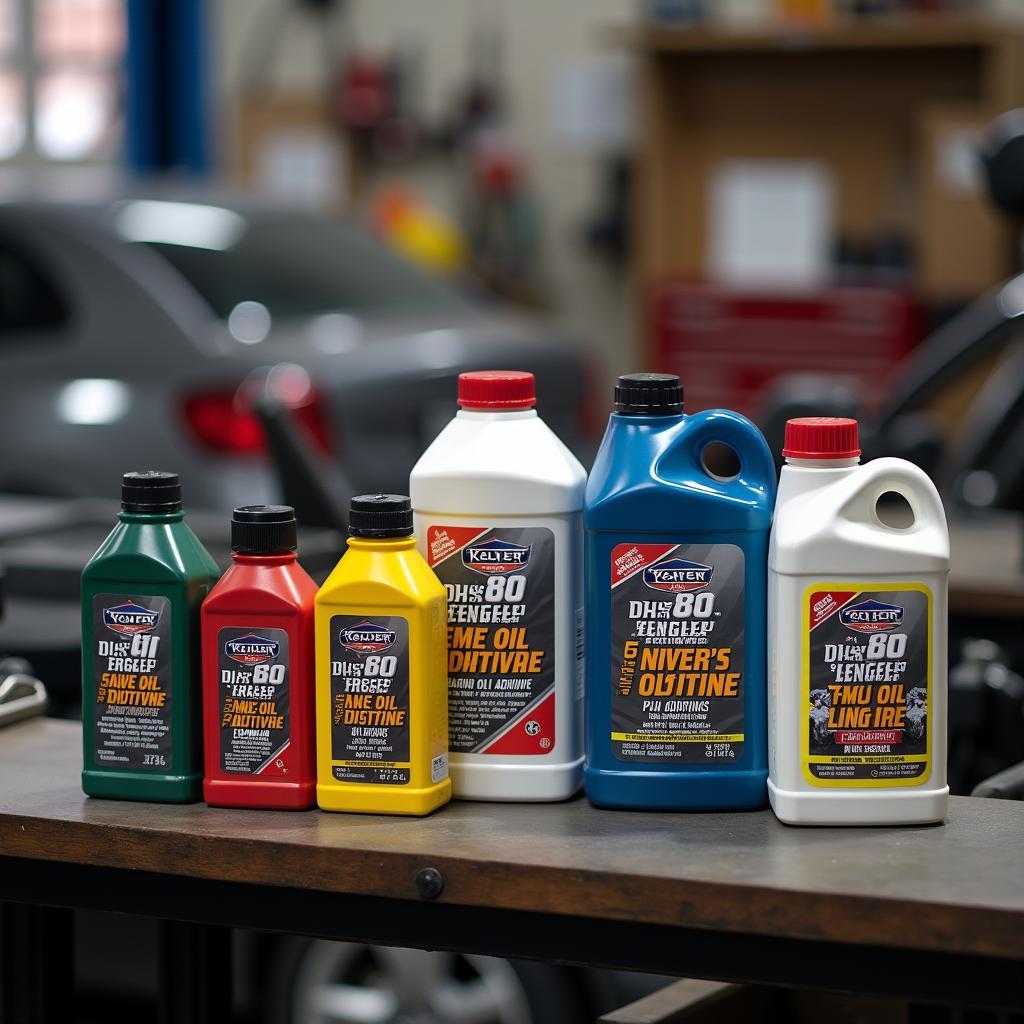Engine oil additives have become increasingly popular with car owners looking to boost their engine’s performance and longevity. But with so many options available, it can be overwhelming to determine Which Car Service Engine Oil Additive Offers the best protection for your vehicle. This article will delve into the world of engine oil additives, exploring their benefits, drawbacks, and key factors to consider when choosing the right one for your car.
Understanding Engine Oil Additives
Engine oil additives are chemical compounds designed to enhance the properties of your engine oil, providing additional benefits beyond basic lubrication. They come in various formulations, each targeting specific areas for improvement, such as:
- Friction modifiers: Reduce friction between moving engine parts, improving fuel efficiency and reducing wear and tear.
- Anti-wear agents: Form a protective layer on metal surfaces, minimizing friction and preventing premature wear.
- Detergents and dispersants: Keep the engine clean by preventing the formation of sludge, varnish, and deposits.
- Antioxidants: Combat oxidation and thermal breakdown of engine oil, extending its service life.
- Viscosity index improvers: Maintain the oil’s viscosity across a wider temperature range, ensuring optimal performance in both hot and cold conditions.
Benefits of Using Engine Oil Additives
Using the right engine oil additive can offer a range of benefits for your car:
- Enhanced engine protection: Additives provide an extra layer of protection against wear, friction, and corrosion, prolonging engine life.
- Improved fuel economy: By reducing friction, additives can contribute to better fuel efficiency.
- Increased engine performance: Additives can help maintain optimal engine cleanliness and performance, resulting in smoother operation and potentially increased horsepower.
- Reduced emissions: Cleaner engines with improved combustion produce fewer harmful emissions.
- Extended oil change intervals: Certain additives can extend the life of your engine oil, allowing for longer intervals between oil changes.
Factors to Consider When Choosing an Engine Oil Additive
Selecting the most effective engine oil additive for your vehicle requires careful consideration of various factors:
- Your car’s age and condition: Older vehicles with higher mileage may benefit from additives specifically designed to address wear and tear.
- Driving conditions: Frequent stop-and-go driving, heavy loads, and extreme temperatures can put additional stress on your engine, requiring specialized additives.
- Oil type and quality: Use additives compatible with your engine oil type (conventional, synthetic blend, or full synthetic) and quality.
- Additive formulation: Consider your car’s specific needs and choose additives that target those areas, such as friction reduction, wear protection, or engine cleaning.
- Brand reputation and reviews: Opt for reputable brands with positive customer reviews and proven track records.
Potential Drawbacks of Engine Oil Additives
While engine oil additives offer potential benefits, it’s essential to be aware of potential drawbacks:
- Compatibility issues: Using incompatible additives with your engine oil can negatively impact its performance and potentially damage engine components.
- Over-additives: Excessive use of additives can disrupt the oil’s chemical balance and lead to unintended consequences.
- Cost: High-quality engine oil additives can be expensive, and their benefits might not always justify the cost.
Expert Insight
“It’s crucial to remember that engine oil additives are not a magic solution for neglecting regular maintenance,” advises John Miller, a certified automotive technician with over 20 years of experience. “The best way to protect your engine is to follow the manufacturer’s recommended oil change intervals and use high-quality oil. Engine oil additives can complement, not replace, proper maintenance practices.”
Conclusion
Choosing the right car service engine oil additive requires careful consideration of your vehicle’s specific needs and driving conditions. While additives can offer various benefits, it’s essential to choose reputable brands, use them responsibly, and prioritize regular maintenance for optimal engine health. Remember, a well-maintained engine is a happy engine!
Frequently Asked Questions (FAQs)
1. Can I use any engine oil additive with my car?
No, not all engine oil additives are compatible with all engine oils or vehicle types. Always consult your owner’s manual or a trusted mechanic to determine suitable additives for your car.
2. How often should I use engine oil additives?
The frequency of using engine oil additives depends on the specific product and your vehicle’s needs. Follow the manufacturer’s instructions or consult a professional for guidance.
3. Are engine oil additives worth the cost?
The cost-effectiveness of engine oil additives depends on various factors, such as your driving habits, vehicle condition, and the specific additive used.
4. Can engine oil additives void my car’s warranty?
Using engine oil additives that meet the car manufacturer’s specifications is unlikely to void your warranty. However, using incompatible additives or exceeding recommended dosages could potentially lead to warranty issues.
5. What are some reputable engine oil additive brands?
Several reputable brands offer high-quality engine oil additives, each with its own strengths and areas of focus. Conduct thorough research and read reviews before making a purchase.
Need Help Choosing the Right Engine Oil Additive?
Contact our team of car care experts via WhatsApp: +1(641)206-8880 or Email: [email protected]. We are available 24/7 to answer your questions and provide personalized recommendations for your vehicle.

